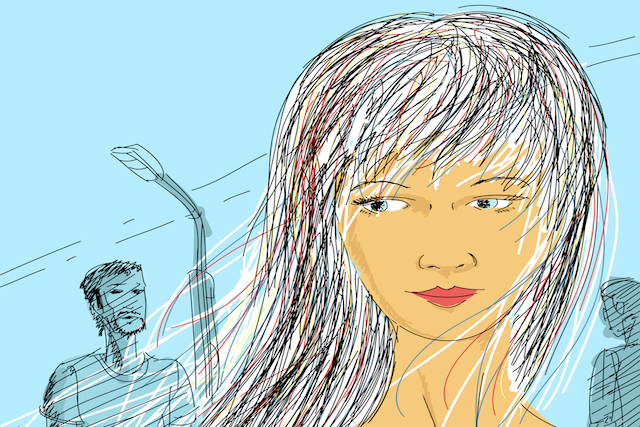
“In a world that treats a forty-one-year-old single woman like a teenager who didn’t get asked to prom, I think it’s extremely important to recognize the unique wisdom of a solitary life—a wisdom that develops slowly over many years, that is fundamentally different from that of, say, the person who was between boyfriends for a year when she was twenty-six.” ~Sara Eckel
I was twenty-three and had just told a woman I was casually dating that I’d never been in a long-term committed relationship.
Her response was this: “Wow, really? I mean, you’re attractive, so why haven’t you?”
Having spent more of my life single than coupled, I’ve become accustomed to questions and comments like these. And although I am currently at a place of contentment and acceptance with my singleness, I wasn’t always. Shame often attaches itself to people (women especially) who remain un-partnered for long patches of time, particularly as we get older.
As author Sara Eckel put it: “In polite society, there’s an understanding that inquiring about the reason two people marry is completely inappropriate. Singles are not afforded this privacy. Instead, the rude inquiries are wrapped in compliments about how attractive and together you are.”
“For many of us, living alone in a society that is so rigorously constructed around couples and nuclear families is hard on the soul,” she wrote.
Look to sites like Quora and Reddit, and you’ll find a plethora of questions posted by the worriedly un-partnered—from “What’s wrong with me? I’ve been single for seven years” to “Do you become undateable after being single for over ten years?”
There are many negative messages and annoying presumptions about singleness percolating through society that I wish would stop. It’s no coincidence in my mind that women (more than men) are the more frequent targets of them.
Here are my own counter-messages that I’ve developed in my thirty-two years as a woman on this planet.
1. It’s quite possible that you’re not trying too hard.
From the time I was eighteen, people told me that the desire for a connection was what kept me from finding one. If I just stopped caring or wanting it, a relationship would find me. As Sara Eckel wrote, “The fact that you want love is taken as evidence that you’re not ready for it.”
I’ve known many people through the years whose desire for a relationship definitely didn’t stop them from finding one.
2. Wanting a relationship doesn’t mean you are ungrateful for all the other positive aspects of your life
In my ambivalently single years, I often felt I was constantly pushing myself to look on the bright side, count my blessings, and express gratitude (both to myself and to those around me) for the friends, hobbies, and other things I had going on in my life.
I feel this way far less now. That is, I don’t feel as if I need to force the gratitude and appreciation; it flows in naturally in response to all the positive that currently fills my life. I’m living it in alignment with my values. I’m spending my time in the ways I want to.
Still, it was okay to want more, even back then. The desire for partnership is human and valid, and it’s more than understandable for it to surface from time to time.
As Rachel Heller put it in Attached (which she coauthored with Amir Levine), “Our need for someone to share our lives with is part of our genetic makeup and has nothing to do with how much we love ourselves or how fulfilled we feel on our own.”
Singles are wired to want love and companionship as much as the next person. Our own company can be wonderful, but we’re not weak if that “there’s something missing” feeling still creeps up unexpectedly some days.
What gets me about this one is the contradiction. Being single raises antennae. So too does the inability to find happiness on one’s own. It’s a bit of a damned if you do, damned if you don’t predicament.
3. It’s completely possible that you genuinely just want companionship, not necessarily someone to satisfy all of your emotional needs.
At times people assume a woman’s desire for a partner is rooted in an unrealistic expectation for a romantic relationship to fulfill all of her emotional needs. The truth for me, back in my twenties, was that I would have been happy to meet some of those needs through platonic connection. The older I got, though, the less available friends seemed to become.
I feel more content with my friendships now, and a combination of expectation adjustment and meeting more like-minded people has helped me to feel like my connection needs are mostly met. But this wasn’t always the case. And for the people out there currently feeling a void, it’s not always due to lack of effort.
As Sara Eckel wrote, “Our society is structured around couples and families—and if you don’t fit neatly into one of those units, you often have to build a support system from scratch, which is a big task. Friends move, or marry, or disappear into time-sucking work projects. And they usually don’t consult you about it.”
Back when I felt more of that connection void, many of my friends had partnered off, become consumed by career commitments, or moved out of the area.
It would be convenient to believe that the full secret to happiness lies completely within oneself. But individual efforts and self-care can only enhance one’s life so much. The truth is we do need others, to some extent. Most of us need (at least some amount of) healthy and satisfying connections. If you feel like you’re doing all that you can and not getting back what you need, it’s disheartening.
4. Your life might actually be full enough as it is.
“Take up a hobby.” “Become a more interesting person.” “Work through your issues.” “Focus on your friendships.” “Get more settled in your career.” These are just some of the many morsels of advice bestowed upon singles.
I think that at times people prescribe the “have a full life” advice too heavily—using it to justify why some remain un-partnered, even when it doesn’t apply.
For instance, back when I really wanted a relationship, I enjoyed the life I’d carved out for myself. I led a mostly full one, making time to hike and appreciate the outdoors at least several times a week. I biked. I read voraciously. I cooked healthy meals. I planned solo trips and made ample time for friends. I kept myself open and receptive to the beauty of the world around me.
Though my job didn’t always feel like a perfect fit and lacked the comfort of a consistent coworker community, it drew upon my skills and passions while allowing me to serve a vulnerable population.
Even though I had all that, I still at times found myself wanting a partner.
The truth is that all kinds of people, from those with full lives to ones with few hobbies, find love. Even people whose lives seem unadorned or ”empty” when viewed from the outside are capable of intimate connections. Our species would not have persisted if the only ones of us who partnered were those with past-times and over-stuffed days.
Many of the same people who prescribed “spend more time with friends or on hobbies” seemed to have also (ironically) been the ones who’d never had to fill their time in this way for more than a year (or maybe two) tops—either because they’d been in a partnership for many years or had only been single intermittently (having spent far more of their adult lives coupled off).
5. The losses of “mini” or “almost” relationships are still losses.
Chronically single people are likelier to have more experience with the dating apps. More time spent in the dating game means more exposure to the muck and unhealed emotional issues that circulates its fetid waters. We’re more susceptible to getting caught up in a frustrating and constant cycle of false hope and cautious optimism, followed by disappointment and disillusionment that the partnered don’t have to deal with.
As much as I wanted to “just get over” some of these dating situations and not let them affect me, as blogger Janis Isaman wrote, “inside our bodies, it doesn’t work that way when we feel loss—over and over again—and lack support, lack feeling, lack an empathetic abiding witness, or lack self-compassion.”
She writes, “this failure to give space to: ‘this is painful,’ ‘this feels like rejection,’ ‘this feels awful’ means we not only abandon our authenticity but also that we experience trauma. The tiny interactions of serial dating transmute themselves up into pain and disconnection, and we might find ourselves increasingly angry or panic-filled because we haven’t metabolized the previous losses.”
Now I’m able to see: these experiences were still losses. Any time you invest heart and time, you are building some form of connection. When that connection dissolves, you will feel the hurt. It’s not only more than okay to feel your feelings; doing so is necessary for moving on.
6. It’s not because you’re broken or need to spend more time healing your issues.
This counsel isn’t totally without merit. In several relationships when younger, I had a lot of issues to work through; I wasn’t emotionally healthy. A relationship would not have been the wisest move.
Still, this piece of advice mythologizes perfect health and implies we can arrive at a place where we’re fully healed—when health is always along a spectrum, with no human ever completely on the side of perfection.
People with far more emotional baggage than both me and other chronically single people I know have found loving connections. Perpetual worriers. “Boring” folks. Individuals all across the spectrum have found partners who think the world of them. They didn’t have to work to improve themselves in order to. They didn’t have to go through years and years of rigorous therapy. They didn’t need a full-on personality transplant.
The underlying message I hear poking out from this piece of advice is this: Change who you are.
What if we were to shift to this message instead? You don’t need to perpetually strive. Therapy can help you become more self-aware, secure in yourself, and clear in what you’re looking for—but ultimately, a lot of meeting a compatible partner has to do with luck, timing, and the types of people you are encountering. You are worthy of love as you are.
Not only does this feel kinder, but also more accurate.
~~
For years I sought reasons to explain my single status. The conclusion I’ve arrived at now is: There is no grand overarching reason. Or rather, there are so many that it’s no use trying to pick them all apart. Seeking to fully untangle the bundle would be an unproductive use of time.
Yes, some societal positions might increase your odds. And healthy relationships are less likely to occur between people with unhealed emotional issues. Ultimately, though, timing and chance are key aspects.
The right partners will grace our lives when they’re meant to. I can’t say when that will happen. I just know that what we can control is the amount of energy we spend pursuing, perseverating, and picking ourselves apart in our pursuit of the “why.”
I feel less urgency to be in a relationship now than before, and I am grateful for this. Having a more discerning lens has allowed me to be a better guardian of my emotional energy (and life in general)—where before, I would let in a questionable fit just for the sake of being able to say I was in a relationship. It has also led to growth that I don’t think I would have achieved if a significant other were a part of the equation.
My hope is for anyone who’s struggled with shame and self-doubt to breathe a little easier, knowing you don’t have to try so hard to improve yourself—that you’re as lovable as the rest of us, exactly as you are.
About Eleni Stephanides
A freelance writer and Spanish interpreter, Eleni was raised and currently resides in the California Bay Area. Her work has been published in Them, LGBTQ Nation Tiny Buddha, The Mighty, Elephant Journal, The Gay and Lesbian Review, and Introvert, Dear among others. She currently writes the monthly column "Queer Girl Q&A" for Out Front Magazine. You can follow her on IG @eleni_steph_writer and on Medium.













 Though I run this site, it is not mine. It's ours. It's not about me. It's about us. Your stories and your wisdom are just as meaningful as mine.
Though I run this site, it is not mine. It's ours. It's not about me. It's about us. Your stories and your wisdom are just as meaningful as mine.
Eleni,
You laid that out very well. I used to believe that I would remain Single all of my life. I aspired to become The Old Maid. I wasn’t against loving people: I just wanted to never marry! I allowed Life to intervene. My live-in really wanted to marry. We at least waited til we were over 30. My High School friend and I swore we wouldn’t marry until we were over 30! She got married a week or two after we did.
I always wanted to have children, though. I let my partner convince me to marry so I’d have insurance (and so would the kids) and the option of staying at home with them. You never know how life is gonna turn out.
Now I’m an old woman who’s been married 32 years! Unbelievable. And we’re still happy. I only have two children of the four I wanted, and life is still great. I’m living a life that I never believed in.
Like I said, you never know how life is gonna turn out!
Now someone needs to tackle the tales of the Child Free – another group that the public goes after with nosey questions.
Best of Life to You Woman!
Jenni, thank you for leaving this beautiful comment! I’m so glad to hear you’re living a life that you love, even if it’s one you didn’t expect 🙂
And I’d be interested in reading a piece on the Child Free too—hopefully we’ll be seeing one soon! Or maybe that can be my next topic to tackle 🙂
Thank you again and all the best to you too <3
Very well written, Eleni ☺️. I’m one of those women over 40 who have never been married. For many years I dealt with very low self esteem because I had been bullied, discriminated against and rejected because I have learning disabilities.
I didn’t want to date a man because I didn’t want him to have to deal with my issues. So I postponed dating indefinitely until I did.
I haven’t had much luck finding the right one but I’m patient.
I’m open to getting married but if I don’t, I’ll be just fine.
Thank you Amy! I’m so sorry to hear you were bullied for your learning disabilities, that hurts my heart to read 🙁 Glad to hear you’re feeling patient though and seem to be in a place of acceptance, it’s so important. Thank you again for taking the time to read and comment <3
Thank you, Eleni ☺️. Yes I am finally at the place of acceptance in my life after a long rocky road.
💖💖💖💖
Wow, I just really have to say thank you. Thank you for the clarity, the love, the affirmation of life you bring across.
Our lives aren’t problems to be solved. And in the end, we humans were born to connect. Having a desire for that isn’t a personal flaw, a sign of weakness, that we have unfinished personal issues that prevent us from tolerating life on our own. It just means we are willing to live and to participate in this dance with life.